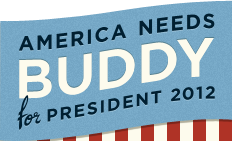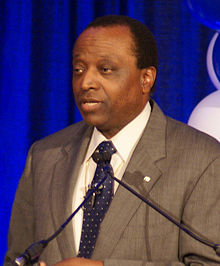
The 1996 United States presidential election was the 53rd quadrennial presidential election, held on Tuesday, November 5, 1996. Incumbent Democratic President Bill Clinton defeated former Senate Majority Leader Bob Dole, the Republican nominee, and Ross Perot, the Reform Party nominee and 1992 Independent presidential candidate.

The Constitution Party, formerly the U.S. Taxpayers' Party until 1999, is a political party in the United States that promotes a religiously conservative interpretation of the principles and intents of the United States Constitution. The party platform is based on originalist interpretations of the Constitution and shaped by principles which it believes were set forth in the Declaration of Independence, the Bill of Rights, the Constitution and the Bible.

The 1992 United States presidential election was the 52nd quadrennial presidential election, held on Tuesday, November 3, 1992. Democratic Governor Bill Clinton of Arkansas defeated incumbent Republican President George H. W. Bush and independent businessman Ross Perot of Texas. The election marked the end of a period of Republican dominance in American presidential politics that began in 1968, and also marked the end of 12 years of Republican rule of the White House, as well as the end of the Greatest Generation's 32-year American rule and the beginning of the baby boomers' 28-year dominance until 2020. It was the last time the incumbent president failed to win a second term until Donald Trump in 2020.

The Reform Party of the United States of America (RPUSA), generally known as the Reform Party USA or the Reform Party, is a centrist political party in the United States, founded in 1995 by Ross Perot.

The American Independent Party (AIP) is a political party in the United States founded in 1968. The party experienced a split in 1976, resulting in the formation of the American Party and the continuation of the American Independent Party. The AIP was affiliated with the national Constitution Party from 1992 to 2008. A leadership dispute occurred within the AIP during the 2008 election cycle following its disaffiliation from the Constitution Party.

The 2008 United States presidential election was the 56th quadrennial presidential election, held on November 4, 2008. The Democratic ticket of Barack Obama, the junior senator from Illinois, and Joe Biden, the senior senator from Delaware, defeated the Republican ticket of John McCain, the senior senator from Arizona, and Sarah Palin, the governor of Alaska. Obama became the first African American to be elected to the presidency, as well as being only the third sitting United States senator elected president, joining Warren G. Harding and John F. Kennedy. Meanwhile, this was only the second successful all-senator ticket since the 1960 election and is the only election where both major party nominees were sitting senators. This was the first election since 1952 in which neither the incumbent president nor vice president was on the ballot, as well as the first election since 1928 in which neither ran for the nomination.

Alan Lee Keyes is an American politician, political scientist, and perennial candidate who served as the Assistant Secretary of State for International Organization Affairs from 1985 to 1987. A member of the Republican Party, Keyes sought the nomination for President of the United States in 1996, 2000, and 2008.
This article contains lists of official third party or independent candidates associated with the 2008 United States presidential election.
The following is a timeline of major events leading up to and immediately following the United States presidential election of 2008. The election was the 56th quadrennial United States presidential election. It was held on November 4, 2008, but its significant events and background date back to about 2002. The Democratic Party nominee, Senator Barack Obama of Illinois, defeated the Republican Party's nominee, Senator John McCain of Arizona.

In early 2007, Ron Paul, a congressman from Texas, announced his candidacy for the Republican Party's nomination for president of the United States in the 2008 election. Initial opinion polls during the first three quarters of 2007 showed him consistently receiving support from 3% or less of those polled. In 2008, Paul's support among Republican voters remained in the single digits, and well behind front-runner John McCain.

The 2008 presidential campaign of Bob Barr, former Congressman of Georgia began on May 12, 2008. He announced his candidacy for the Libertarian Party's president after months of grassroots draft efforts. Barr was criticized by Libertarians who opposed his efforts in Congress, which included sponsorship of the Defense of Marriage Act and votes in favor of the USA PATRIOT Act and authorization of the War in Iraq, but he was supported by others who accepted his regret for those positions. Barr won the party's nomination after six rounds of balloting at the 2008 Libertarian Party National Convention. Former contender Wayne Allyn Root was named as his running mate. Reason magazine senior editor Radley Balko called Barr "the first serious candidate the LP has run since I've been eligible to vote."

The Chuck Baldwin presidential campaign of 2008 began April 10, 2008 as pastor and radio host Chuck Baldwin of Florida announced his candidacy for the Constitution Party presidential nomination. He previously served as the party's vice-presidential nominee in 2004. Baldwin's main opposition for the nomination was former ambassador Alan Keyes, who had just left the Republican Party. After a campaign touting his stands on civil liberties, foreign affairs, and religion, Baldwin won the nomination at the April 26 Constitution Party National Convention. Attorney Darrell Castle was selected as his running mate.

The 2012 presidential campaign of Buddy Roemer, 52nd Governor of Louisiana and former U.S. Representative of Louisiana began as a movement for the 2012 Republican Party nomination for President of the United States shortly following the 2010 midterm elections. After his exclusion from every nationally-televised Republican debate, Roemer announced on February 22, 2012 that he would instead pursue a place on a third-party ticket, specifically the Reform Party and Americans Elect nominations. Shortly after Americans Elect announced they would not be fielding a candidate, Roemer's campaign announced on May 31, 2012 that he was ending his 2012 presidential campaign altogether.
Thomas Conrad Hoefling is an American activist and politician, who was the founder and national chairman of America's Party. Hoefling was the party's 2012 and 2016 presidential nominee, after seeking the nomination of the Constitution and American Independent parties. Currently a member of the Republican Party, Hoefling has served as political director for Alan Keyes' political group America's Revival and as a representative for the American Conservative Coalition.
The Virgil Goode presidential campaign of 2012 began when former U.S. Congressman Virgil Goode of Virginia announced his decision to seek the 2012 presidential nomination of the Constitution Party in February 2012. During the nomination campaign, he put forth a four-point plank that included his plans to restrict immigration, balance the federal budget, decrease the size of government, and institute congressional term limits.

The 2016 Green Party presidential primaries were a series of primaries, caucuses and state conventions in which voters elected delegates to represent a candidate for the Green Party's nominee for President of the United States at the 2016 Green National Convention. The primaries, held in numerous states on various dates from January to July 2016, featured elections publicly funded and held as an alternative ballot, concurrent with the Democratic and Republican primaries, and elections privately funded by the Green Party, held non-concurrently with the major party primaries. Over 400 delegates to the Green National Convention were elected in these primaries, with a candidate needing a simple majority of these delegates to become the party's nominee for president.

The 2000 presidential campaign of Alan Keyes, former Assistant Secretary of State for International Organization Affairs from Maryland began when he formed an exploratory committee, simply called Keyes 2000, on June 17, 1999, with a formal announcement on September 21, 1999 in Bedford, New Hampshire. He ran in the 2000 presidential primaries, opposing Texas governor George W. Bush and Arizona Senator John McCain for his party's nomination. Keyes campaigned as a more ideologically consistent candidate than John McCain, taking right-wing positions on issues, including abortion, gun control, and government spending.
This is a timeline of major events leading up to, during, and after the 2024 United States presidential election. This will be the first presidential election to be run with population data from the 2020 census. In addition to the dates mandated by the relevant federal laws such as those in the U.S. Constitution and the Electoral Count Act, several milestones have consistently been observed since the adoption of the conclusions of the 1971 McGovern–Fraser Commission.














